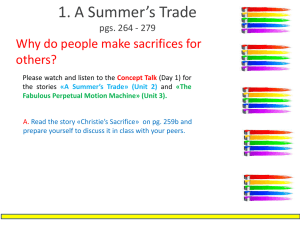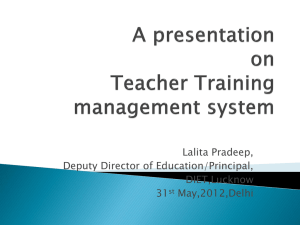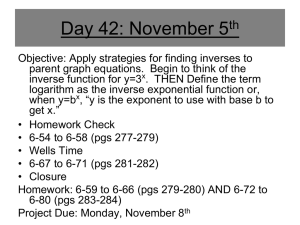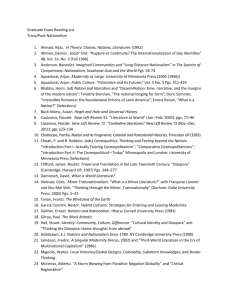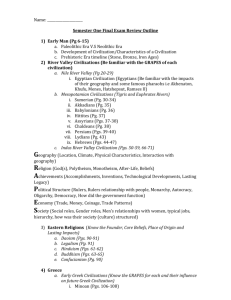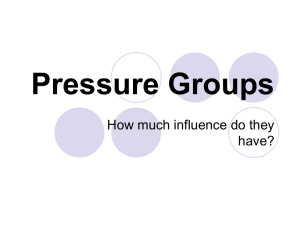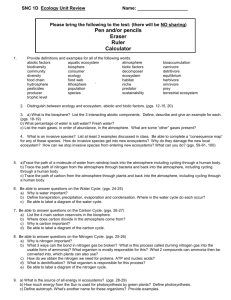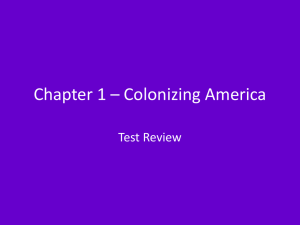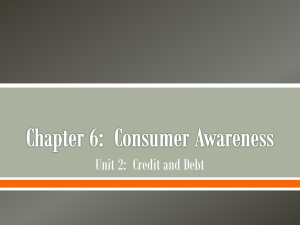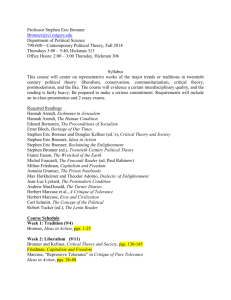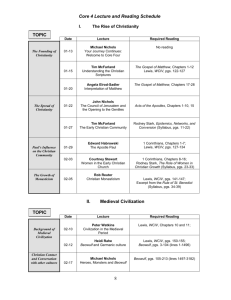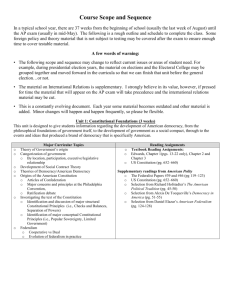Link
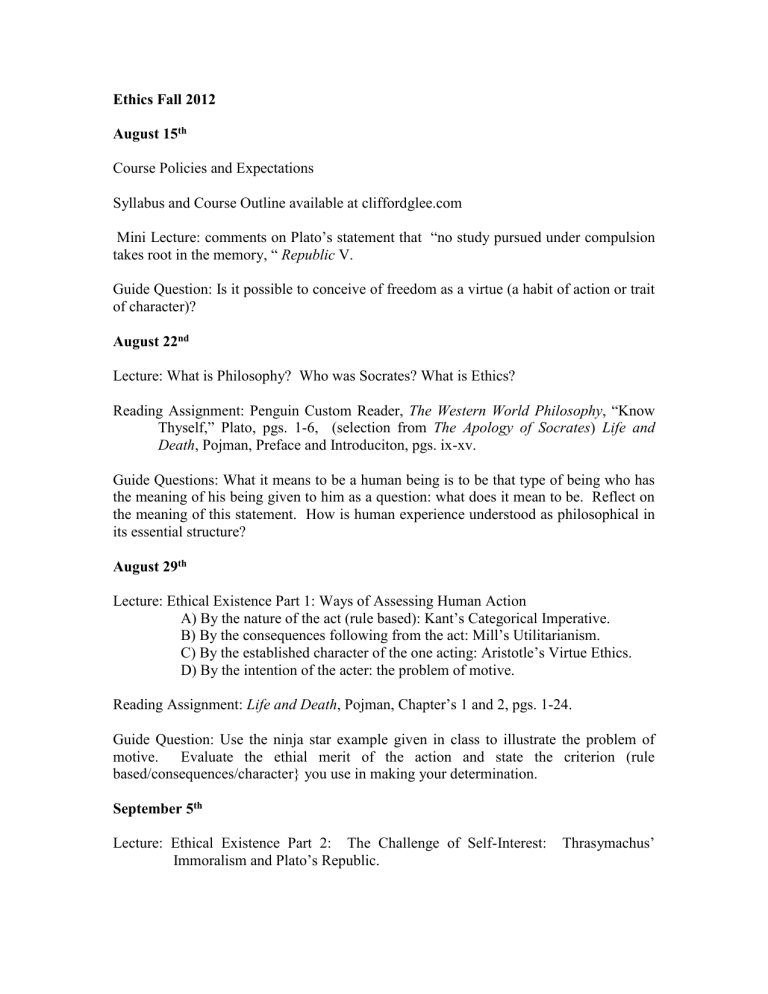
Ethics Fall 2012
August 15 th
Course Policies and Expectations
Syllabus and Course Outline available at cliffordglee.com
Mini Lecture: comments on Plato’s statement that “no study pursued under compulsion takes root in the memory, “ Republic V.
Guide Question: Is it possible to conceive of freedom as a virtue (a habit of action or trait of character)?
August 22 nd
Lecture: What is Philosophy? Who was Socrates? What is Ethics?
Reading Assignment: Penguin Custom Reader, The Western World Philosophy
, “Know
Thyself,” Plato, pgs. 1-6, (selection from The Apology of Socrates ) Life and
Death , Pojman, Preface and Introduciton, pgs. ix-xv.
Guide Questions: What it means to be a human being is to be that type of being who has the meaning of his being given to him as a question: what does it mean to be. Reflect on the meaning of this statement. How is human experience understood as philosophical in its essential structure?
August 29 th
Lecture: Ethical Existence Part 1: Ways of Assessing Human Action
A) By the nature of the act (rule based): Kant’s Categorical Imperative.
B) By the consequences following from the act: Mill’s Utilitarianism.
C) By the established character of the one acting: Aristotle’s Virtue Ethics.
D) By the intention of the acter: the problem of motive.
Reading Assignment: Life and Death
, Pojman, Chapter’s 1 and 2, pgs. 1-24.
Guide Question: Use the ninja star example given in class to illustrate the problem of motive. Evaluate the ethial merit of the action and state the criterion (rule based/consequences/character} you use in making your determination.
September 5 th
Lecture: Ethical Existence Part 2: The Challenge of Self-Interest: Thrasymachus’
Immoralism and Plato’s Republic.
Reading Assignment: Penguin Custom Reader, “Right is the Interest of the
Stronger,” pgs. 6 – 29, (selection from the
Craft Analogy Handout (online)
Republic )
Guide Questions: Identify Thrasymachus’ two definitions of justice in the text. How does his first attempt, often characterized as “might makes right,” reduce to obedience to the law or “conventionalism?” What is the cause of the apparent change in his position from conventionalism to his second formulation of immoralism?
September 12 th
Lecture: Ethical Existence Part 3: Human Nature and Plato’s Use and Abuse
of Art: the Ring of Gyges, the Origins of Justice and the Life of the Happy
Unjust Man.
Reading Assignment: Penguin Custom Reader, “The Ring of Gyges,” pgs. 31 – 38; and
“The Simile of the Cave,” pgs. 117-127. (selections from the
Republic )
Guide Questions: How does Glaucon make use of allegory and myth in formulating his three points and how does this strengthen Thrasymachus’ argument: 1) what most understand to be the nature and origin of justice; 2) those of us who are just are not so by choice; 3) the life of the unjust man is preferable to the life of the just man.
September 19 th
Lecture: Ethical Existence Part 4: The Kallipolis : An Education in Justice for the City
and Soul.
Reading Assignment: Penguin Custom Reader, “Justice in State and Individual,” pgs.
93 – 116. (selection from the Republic ).
Handout “Justice in the City and the Soul,” (online)
Guide Question: Name the three classes of the just city and the three parts of the just human soul that parallel the structure of the city. Justice resides within the relations between the three classes of the city and the three parts of the soul. How so? What role does the Spirit play in the shaping of the good life? Discuss the role education plays in providing the conditions for the achievement of such a life.
September 26 th
Class will not meet. You have the assignment of preparing for the midterm by carefully working out answers to all questions on the study guide.
October 3 rd
MidTerm
Lecture (Second half of class): An Introduction to Aristotle’s Ethics: Eudaimonia .
October 10 th
Lecture: Ethical Existence Part 5: The Logos of Emotion: Aristotle’s Analysis of
the Lived World and the Ideal of the Eudaimoniac .
Reading Assignement: Penguin Custom Reader, “The Object of Life,” and
“Happiness is the Goal of Human Life,” pgs. 127 – 146, (selections from the
Nicomachean Ethics ).
Guide Questions: Why, according to Aristotle, do the following forms of
life not produce the state of fulfillment that is the goal of human life: the life devoted to the pursuit of pleasure, the life devoted to the accumulation of wealth and the life devoted to honor or fame? Explain Aristotle’s concepts of virtue and vice and how the habituated experience of emotion shapes the quality of our lives. Why is reason a potentially misleading translation of Logos , the distinctive human capacity of giving form, order and meaning to our own experience?
October 17 th
Lecture: Death and the Meaning of Life Part 1: Aristotelian Courage and the Absurd
and Unknowlable Face of Death.
Reading Assignment: Penguin Custom Reader, “The Myth of Sisyphus,” pgs.
266 – 271, (from Camus’ The Myth of Sisyphus );
Life and Death , Pojman, Ch. 5 “The Sanctity of Life vs. The Quality of Life,”
Pgs. 55 – 65.
Guide questions: Explain the difference between everyday fear and
existential anxiety. How does the myth of sisyphus represent the absurdity
of the human condition and why does Camus give as an imperative: we must imagine Sisyphus happy?
October 24 th
Lecture: Death and the Meaning of Life Part 2: Philosophical Appropriations:
Platonism, Epicureanism, Stoicism and Existentialism.
Reading Assignment: Life and Death
, Pojman, Ch. 6 “Views of Death in Western
Society, pgs. 65 – 74.
Guide Question: What are some of the similarities running throug the varied interpretations given to death by Platonism, Epicureanism, Stoicism and Existentialism?
October 31 st
Lecture: Death and the Meaning of Life Part 3: The Question of a Good Death and
The Possibility of a Bad Life: Euthanasia, Suicide and Socrates.
Reading Assignment: Life and Death , Pojman, Ch. 7 “Suicide,” and Ch. 8
“Euthanasia,” pgs. 75 – 95.
Guide Questions: How are we to reflect on the life and death of Socrates in the light
of the concept of a good death?
November 7 th
Lecture: Death and the Meaning of Life Part 4: Abortion: Actuality and Potentiality of Personhood and Our Questionable Right to Exist
Reading Assignment: Life and Death
, Ch. 10, “Abortion: The Greatest Moral Problem
Of Our Generation, pgs. 107 – 119.
Guide Question: To Be Announced.
November 14 th
Lecture: Other Matters of Living and Dying: Cloning, The Death Penalty and War
Conclusion: Death and Hope for the Good Life
Reading Assignment: To Be Announced.
Novermber 21 st
Thanksgiving Break
November 28 th
2:30 Final Exam
